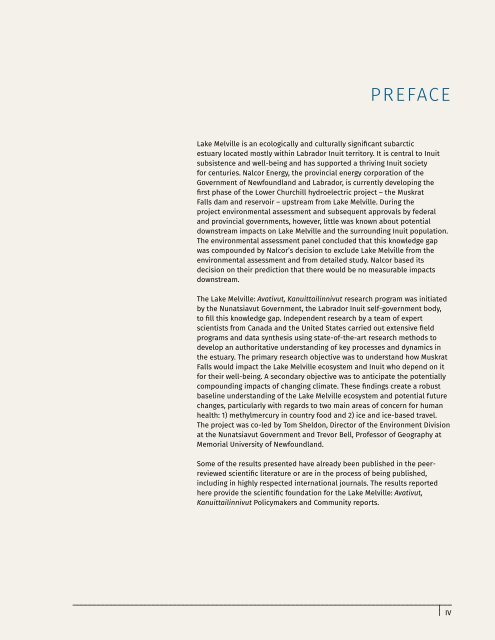Lake Melville
1rw7Mns
1rw7Mns
You also want an ePaper? Increase the reach of your titles
YUMPU automatically turns print PDFs into web optimized ePapers that Google loves.
PREFACE<br />
<strong>Lake</strong> <strong>Melville</strong> is an ecologically and culturally significant subarctic<br />
estuary located mostly within Labrador Inuit territory. It is central to Inuit<br />
subsistence and well-being and has supported a thriving Inuit society<br />
for centuries. Nalcor Energy, the provincial energy corporation of the<br />
Government of Newfoundland and Labrador, is currently developing the<br />
first phase of the Lower Churchill hydroelectric project – the Muskrat<br />
Falls dam and reservoir – upstream from <strong>Lake</strong> <strong>Melville</strong>. During the<br />
project environmental assessment and subsequent approvals by federal<br />
and provincial governments, however, little was known about potential<br />
downstream impacts on <strong>Lake</strong> <strong>Melville</strong> and the surrounding Inuit population.<br />
The environmental assessment panel concluded that this knowledge gap<br />
was compounded by Nalcor’s decision to exclude <strong>Lake</strong> <strong>Melville</strong> from the<br />
environmental assessment and from detailed study. Nalcor based its<br />
decision on their prediction that there would be no measurable impacts<br />
downstream.<br />
The <strong>Lake</strong> <strong>Melville</strong>: Avativut, Kanuittailinnivut research program was initiated<br />
by the Nunatsiavut Government, the Labrador Inuit self-government body,<br />
to fill this knowledge gap. Independent research by a team of expert<br />
scientists from Canada and the United States carried out extensive field<br />
programs and data synthesis using state-of-the-art research methods to<br />
develop an authoritative understanding of key processes and dynamics in<br />
the estuary. The primary research objective was to understand how Muskrat<br />
Falls would impact the <strong>Lake</strong> <strong>Melville</strong> ecosystem and Inuit who depend on it<br />
for their well-being. A secondary objective was to anticipate the potentially<br />
compounding impacts of changing climate. These findings create a robust<br />
baseline understanding of the <strong>Lake</strong> <strong>Melville</strong> ecosystem and potential future<br />
changes, particularly with regards to two main areas of concern for human<br />
health: 1) methylmercury in country food and 2) ice and ice-based travel.<br />
The project was co-led by Tom Sheldon, Director of the Environment Division<br />
at the Nunatsiavut Government and Trevor Bell, Professor of Geography at<br />
Memorial University of Newfoundland.<br />
Some of the results presented have already been published in the peerreviewed<br />
scientific literature or are in the process of being published,<br />
including in highly respected international journals. The results reported<br />
here provide the scientific foundation for the <strong>Lake</strong> <strong>Melville</strong>: Avativut,<br />
Kanuittailinnivut Policymakers and Community reports.<br />
IV


